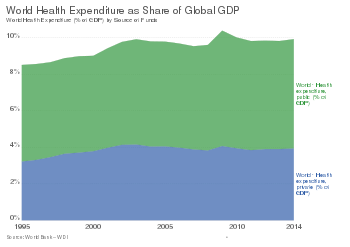
Health economics
Branch of economics / From Wikipedia, the free encyclopedia
Dear Wikiwand AI, let's keep it short by simply answering these key questions:
Can you list the top facts and stats about Health economics?
Summarize this article for a 10 years old
Health economics is a branch of economics concerned with issues related to efficiency, effectiveness, value and behavior in the production and consumption of health and healthcare. Health economics is important in determining how to improve health outcomes and lifestyle patterns through interactions between individuals, healthcare providers and clinical settings.[2] In broad terms, health economists study the functioning of healthcare systems and health-affecting behaviors such as smoking, diabetes, and obesity.


One of the biggest difficulties regarding healthcare economics is that it does not follow normal rules for economics. Price and Quality are often hidden by the third-party payer system of insurance companies and employers. Additionally, QALY (Quality Adjusted Life Years), one of the most commonly used measurements for treatments, is very difficult to measure and relies upon assumptions that are often unreasonable.[3]
A seminal 1963 article by Kenneth Arrow is often credited with giving rise to health economics as a discipline. His theory drew conceptual distinctions between health and other goods.[4] Factors that distinguish health economics from other areas include extensive government intervention, intractable uncertainty in several dimensions, asymmetric information, barriers to entry, externality and the presence of a third-party agent.[5] In healthcare, the third-party agent is the patient's health insurer, who is financially responsible for the healthcare goods and services consumed by the insured patient.
Health economists evaluate multiple types of financial information: costs, charges and expenditures.
Uncertainty is intrinsic to health, both in patient outcomes and financial concerns. The knowledge gap that exists between a physician and a patient creates a situation of distinct advantage for the physician, which is called asymmetric information.
Externalities arise frequently when considering health and health care, notably in the context of the health impacts as with infectious disease or opioid abuse. For example, making an effort to avoid catching the common cold affects people other than the decision maker[6][7][8]: vii–xi [9] or finding sustainable, humane and effective solutions to the opioid epidemic.
